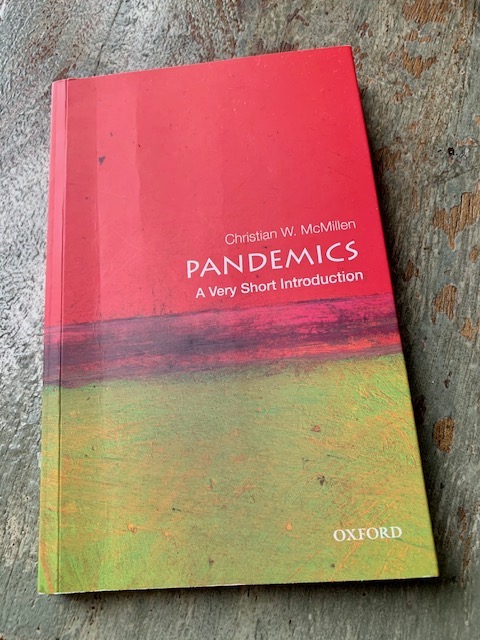From time to time I share notes about the books I’ve been reading, or have revisited recently after many years.
These posts are meant to help me remember what I’ve learned, and to point out titles I think are worth consulting.
They’re neither formal book reviews nor comprehensive book summaries, but I hope you find them useful. For previous postings, see my Book Notes category.
Pandemics: A Very Short Introduction
Published: 2016
Publisher: Oxford University Press
ISBN: 978–0199340071
Amazon link
Brief Summary
When it comes to pandemics – including Covid–19 – there’s nothing new under the sun.
My Three Key Takeaways
- I read this short (153-page) book, by University of Virginia historian Christian McMillen, earlier this year, as Covid–19 began spreading across the globe.
My major takeaway: pandemics have long ravaged human populations, of course, and Covid–19 has several historical parallels.
When cholera hit Europe in the 19th century, merchants rebelled against about trade restrictions. (See the conflict today between those who want to reopen economies and those who think strict lockdowns must continue for public health.)
When the 1918 influenza swept through nations, authorities in the U.S. and U.K. downplayed its severity. (See how some world leaders this year reacted to Covid–19.)
- Whether it’s cholera, HIV, malaria or tuberculosis, poorer people and poorer countries are usually hit hardest. It makes sense: richer people can quarantine themselves and have access to the best medical care.
(The coronavirus hasn’t run its full course anywhere, really, it seems. But news from places like Brazil and India – not to mention the U.S., the world’s richest nation – is worrying.)
- We have been largely complacent when faced with the possibility of another global pandemic, McMillen writes.
Some notable quotations (all emphasis mine)
- From the end of the chapter on influenza:
“The 1918 influenza was an event. Unlike malaria and tuberculosis – the perpetual pandemics – influenza comes and goes. In this way it is more like smallpox or plague. Of course these two diseases are no longer major global threats. Influenza is. When H5N1 appeared in humans in 1997 and the novel strain of H1N1 turned up in 2009, the world was reminded of the possibility of another 1918. It has not happened yet. We do not know when it will.”
- From the epilogue, in discussing the WHO’s “lackluster response” to Ebola:
“…the WHO is, for better or worse, representative of a way of seeing things in the world of global health, and the leadership’s statement on lessons learned allows me to make a point: every single lesson it learned (or in one instance relearned) could have been gleaned from a look at the past. These lessons are not new; the history of epidemics and pandemics has been teaching them for centuries.”
